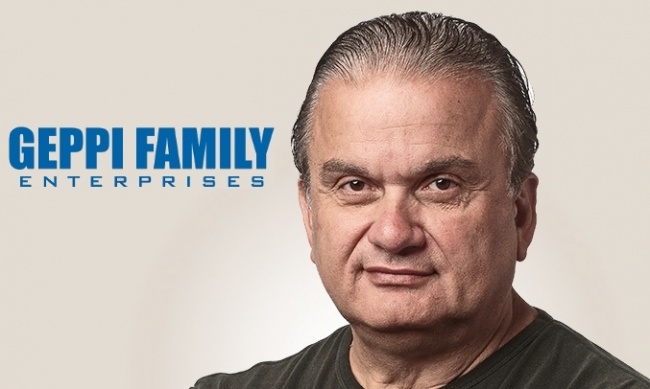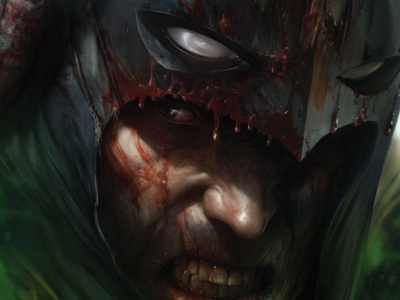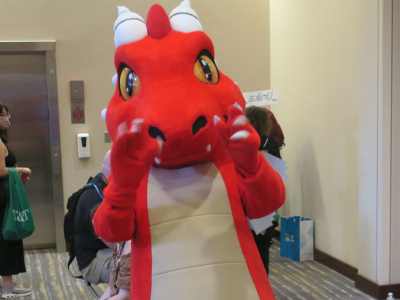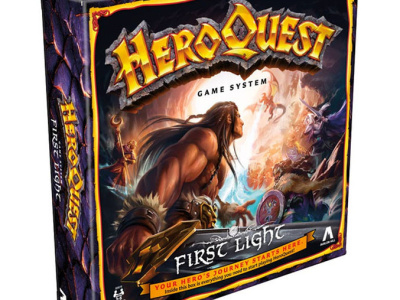As the coronavirus crisis has taken hold, CEO Steve Geppi of Geppi Family Enterprises, the company that owns Diamond Comic Distributors, Alliance Game Distributors, Diamond Book Distributors, and numerous other companies, has suddenly become more visible than he’s been in decades. We caught up with Geppi on Monday, May 11, for a wide-ranging interview about the current situation and his plans for the future. The interview was edited for length and clarity.
In Part 5 of this five-part interview, below, we talk about the reorganization of Geppi’s companies into Geppi Family Enterprises, his plans for the future of his companies, and for his ownership of them.
In Part 1, we asked about key decisions made at the end of March: to shut down most functions at Diamond and Alliance, and to delay payments to vendors. In Part 2, we talked about the surprising impact on Diamond’s relationship with DC Comics, its second largest supplier. In Part 3, we talked about how GFE companies will handle the product caught in the pipeline between order and shipment during the shutdown, and Diamond’s new competitive landscape. In Part 4, we talked about what will happen if there’s rolling chaos, with regional shutdowns and openings across the country, and plans for Free Comic Book Day.
ICv2: Let's back out to 30,000 feet. You talked a little bit about some of the goals of the reorganization into Geppi Family Enterprises. Where are you headed with that? What's the goal in terms of what kind of a company you’re trying to make? What would the management look like? What would ownership look like?
Steve Geppi: I am describing what we're doing (a popular word these days you see in every business) restructuring, but I'm also using the word rebranding. The rebranding side, I'll address, because the restructuring is obvious, but I'll get at the details. The rebranding side has to do with me not trying to eliminate the name Diamond Comic Distributors, or Alliance, or Diamond Book, they're all great DBAs, but I want the industry to recognize… I think there's a lot of people don't even know I own some of these other companies. You could probably ask some people and say, "Who owns Hake's?" They'll say, "I don't know." "Who owns Gerber?" "I don't know." "Who owns Gemstone?" "I don't know."
More and more people do, but I want them to know that Steve Geppi's Family Enterprises are, one, the united asset for the industry, if I may be so presumptuous. We are the guys that want to give you whatever it is you need to run your store. We want to give you comic books. We want to give you games. We want to supply your Mylar, your price guides, if you have auctions, whatever it is that will make our industry look less fragmented.
We want everybody to view back issue comics as part of our market. Yeah, we all know that, but today half of these stores don't even carry back issues and I may sound like an ingrate, because I'm the one that's benefited. If they only carry new product, hey, that's great. Keep buying the new product, fill up your store.
I don't get anything out of the back issues. One of the things I'm considering doing is starting a back issue business. That's not going to happen overnight, but to be able to have a customer walk into any store and have an app that knows the retailer also has that app, that whatever it is he wants, whether it's a new product or supply, a game, a toy, he can say yes, because some stores are bigger than others, and even the biggest store can't carry everything. I want them to have the ability to say,
"I need Spider‑Man #806, and they're on #825. Do you have it?"
"Oh, I don't have it right now. I can probably get it for you."
"Well, I want it now."
"All right. Let me see if my supplier has it."
No different than if he ordered a back graphic novel, it could be there with the next shipment. In the scheme of rebranding, Geppi Family Enterprises is going to be something that I want people to know covers all of these bases. I don't necessarily mean that's going to be a consumer word, Geppi Family Enterprises, but I certainly want the industry people to know all what I bring to the table in the way of access that they can make use of.
In addition to physical products, information. I want them to know we're the place to look to be able to get answers to your questions. At some point in time, I'd like to think there'll be an ability to provide to them services that relate to financial planning, or how to open a store, or how to get the right advice on a point of sale.
Separately, they have their value, but I believe the sum of the parts is greater than the total. That's the branding side.
On the restructuring side, I've operated for years with me and five other guys being in their respective positions. There was Chuck Parker as the chief operating office of the company, that pretty much ran the day‑to‑day; Larry Swanson, chief financial officer, vice president of finance; Bill Schanes was the guy in purchasing, and Roger [Fletcher] was the guy in marketing. Cindy [Fournier] was the person in operations. We are not only changing some of those people, but we're creating newer areas.
Kathy [Govier] is on the phone. Kathy is going to be our Chief Marketing Officer, but she won't just market for Diamond Comic Distributors, Alliance, DUK, and DST… All of my companies will be part of Kathy's responsibility, not just in their individual worlds, but collectively to the bigger world.
The branding and the restructuring are designed to give us a better scope so that we can evolve. As I mentioned earlier, we've got the biggest law firm, we've got the biggest bank, and we've got the biggest accounting firm.
We want to formulate this company and position it to be in a position or a platform to do just about anything it has to do with the world that we penetrate called pop culture.
As I said before, there's going to be opportunities, and it may be in a field that isn't even part of our pop culture world. Let's say it's music, and all of a sudden, because the music industry's upside‑down, and there becomes a distribution opportunity or even something else, maybe that opens a door there. What does it do for us? It gives me revenue, but what else does it do? It may be something that now comic stores can access through their distributor to do music. I'm just throwing crap out there. I'm just saying, I want to make Geppi Family Enterprises as wide of an asset as it can be for the industry that we serve.
You talked about merging the marketing function. What about logistics, information technology? For example, can you service game stores and comic stores out of the same warehouses, and give both groups the access to all the inventory from either category?
Yes. That's part of the plan. I don't want to spook any employees ‑‑ "Oh, my gosh, he's going to shut down Indianapolis or Fort Wayne, because he's going to ship to it over to…" ‑‑ but we will look at what's the best way to service the industry logistically, not necessarily only because it saves us money, and it's the right thing to do for right‑sizing. Of course, we're going to take that into account, but we're not going to ship everybody out of San Diego because we save money, and the rest of the world has to deal with freight costs.
We're going to try to find in the combined entities, plural (all of them, not just Alliance, not just comics and games, but everything else) if there's a way that we can better serve the market. Maybe here's a good example of thinking out loud.
Gerber, little Gerber, that does a really good business, and they're the king of the Mylar business. Buying Mylar from Gerber, and you live in Oregon, is a tremendous freight burden. Maybe there's a way that I can figure out how to get the Gerber operation, or part of it, at least, in a more regional location, so that freight costs become less. One example.
Publishing, whether Gemstone only does price guides, or does guide books, like they're doing now. Maybe if they get to the size, the volume where it makes more sense to do them out of another place, who knows.
The logistics, and particularly the technology, we have a new guy who is one of the best hires I think we've ever made. This guy is awesome, and of course, everybody in their own has their own awesome tech guy genius, because most of us don't know enough, and everybody's a genius for us. He's really good at not only what he does, but organizing, and that's part of his task. He is looking at all our systems across all companies to try to figure a way to A, to bring us into the 21st century more so than we are, and B, to uniformize them to the degree he can so that we'll be more free‑flowing and fluid, so that the retailers that depend on us won't have to worry, "Well, I've got to order Diamond this way, I've got to order this one that way." In a perfect world, every one of our customers, will have some kind of technology, app or whatever, ability to see it that's seamless, so we aren’t so unique to each company, if that makes sense.
Then what about ownership? Sometimes, at this stage in life, people look at planning for a future when they're not around anymore. We've heard rumors that you've looked at a possible sale of the company. Is that true, and can you talk about that?
I can definitely talk about that. It's not true. I have no intention of selling Diamond. I guess if Bill Gates decides he wants to pay me something that it's not worth, I'd have to look. Believe it or not, at 70 years old, I've gotten rejuvenated. Now, that said, I don't have the same luxury of when I was 30 years old of looking ahead to the next 40, although I hope I live to be 110, but I have my son really involved now, and Josh is just becoming a superstar for me, not being prejudicial towards my children.
I have an estate plan now in effect that protects my family with executors who know how I want this to go (God forbid, the day comes either prematurely through an accident or just by natural course) that I want this company to continue on and I want to protect the industry.
I'll give you an example of that, too, on a different level. When I closed my museum and donated a portion of my collection to the Library of Congress, part of the thought process was this.
Right now, I love it when somebody else breaks up their collection at estate time, and I get to buy it and sell or keep it. I didn't want my own collection to be something that I've spent my whole life building to be just dismantled, sold off in pieces, and have no identity.
So when I sat down and started doing my estate planning, I knew that my kids were going to be protected financially. Even if they have an interest or didn't have an interest in my collection for posterity, they're not going to live forever, just like I'm not going to live forever. So for the sake of the industry, if I might be so presumptuous, or for the sake of the collections themselves, knowing how rare they are, knowing how hard they are to get, I wanted to have arrangement where they would live on in perpetuity through an institution that in theory will live on in perpetuity. The idea was I'll donate a big chunk of my collection (keep in mind, I have plans to donate even more as times goes on to the Library of Congress) so there will be a place 100 years from now, 200 years from now, whatever, we don't know the future, where other people will look back on our industry and be happy to say, "God, I'm glad somebody preserved that."
In addition to that, what it does for the Library of Congress, they have stuff that nobody knows they have that just sits in a basement, in an archive, waiting for the big flood or fire to destroy it. They are so thrilled, the people particularly who work in the archives, that this is not only going to give them a place to put my stuff, but their stuff will also be part of the rotating exhibits, and the traveling exhibits.
There's an example of me looking past my lifetime. Similarly, as it relates to the industry, which is equally important to me, vis‑à‑vis an industry that I feel I've played a part of, Diamond played a big part of, I want Diamond, through Geppi Family Enterprises, to have in theory an unending future. Nobody can predict the future, but I don't want anybody to write my epitaph and say, "Steve Geppi had this great, dominant position in the industry, and when it was time to pack it in, he said screw the rest of the people. I have mine. I got my money, my kids are protected." No.
I feel a fiduciary responsibility to retailers who want an entity to exist that will continue to supply them, evolve, and get better and better. That's what I've done. I am not interested in selling. It's not on my radar.
I get letters every day, all the time, offering… Every day you get these bogus, generic ones. Then you get the ones that are really specified, people asking. If I ever did get to the point where I thought I was going to do that, I can tell you this. It would be very, very finite as to how it would have to go down. Number one, my employees would have to be protected. I wouldn't want them to be suddenly on the chopping block, so to speak. I would want the industry to be protected.
It may be a hard sell, if I did, because there'd be too many qualifiers. Right now, at 70 years of age, revitalized, energized, back in action, talking to all the publishers, getting on shows, I'm having a blast. Although I know I can't live forever, I'm going to do my best to have this industry have a distributor that will perpetuate its existence.
Click here to go back to Part 1.

GFE's Restructuring and Rebranding, Future Plans for the Companies and Ownership
Posted by Milton Griepp on May 21, 2020 @ 3:29 am CT
MORE COMICS
From Dynamite Entertainment
August 8, 2025
Here's a preview of Space Ghost #1, published by Dynamite Entertainment.
Dark, Erotic Manga Based on Short Story by Edogawa Rampo
August 8, 2025
Maruo brings his signature “erotic grotesque” style to a dark tale by writer Edogawa Rampo.
MORE NEWS
Thursday July 31, 2025; 'D&D,' 'Riftbound,' and More!
August 8, 2025
The story of Gen Con 2024, as told through ICv2's staff photos, began on the morning of Thursday July 31, 2025 on the convention hall floor.
New Expansion Set for the Classic Fantasy Board Game
August 8, 2025
Hasbro will release HeroQuest: First Light, a new expansion for the classic fantasy board game, into retail.








